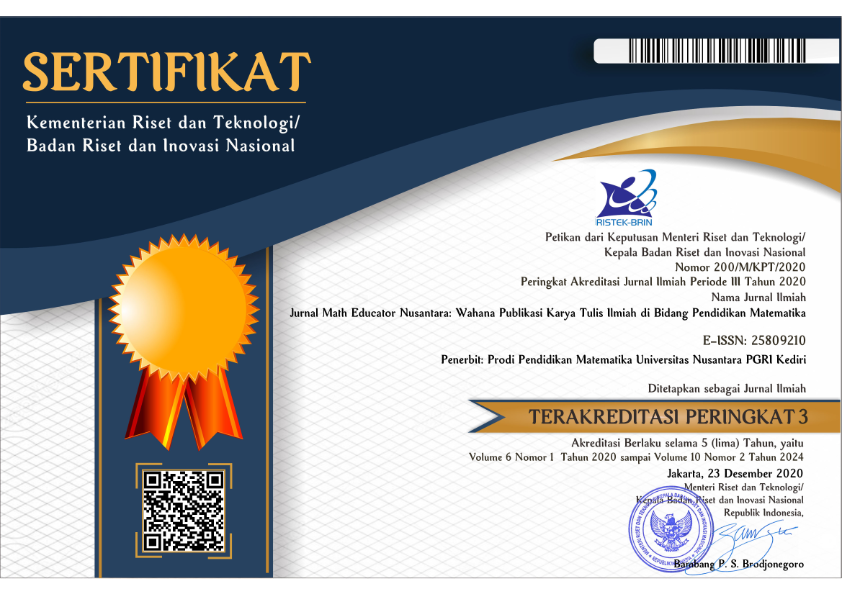Pengaruh motivasi belajar terhadap prestasi belajar matematika siswa kelas VIII SMP negeri 1 Kuala Behe
DOI:
https://doi.org/10.29407/jmen.v5i01.12810Keywords:
motivasi belajar, prestasi belajar, matematikaAbstract
Tujuan penelitian ini untuk mengetahui pengaruh motivasi belajar terhadap prestasi belajar matematika siswa kelas VIII SMP Negeri 1 Kuala Behe Tahun Ajaran 2018/2019 Kabupaten Landak. Jenis penelitian ini adalah kuantatif dengan pendekatan ex post facto. Populasi semua siswa Kelas VIII SMP Negeri 1 Kuala Behe. Jumlah sampel pada penelitian ini adalah sebanyak 64 siswa yang dipilih dengan menggunakan teknik sampling jenuh. Teknik analisis data menggunakan regresi linear sederhana dengan uji prasyarat yaitu normalitas dengan metode Kolmogorov-Smirnov, heteroskedastisitas dengan metode Glejser, linearitas dengan menggunakan test for linearity, Multikolonieritas dengan menggunakan Variance Inflation Factor (VIF), dan Outokorelasi dengan metode Durbin-Watson. Hasil penelitian menunjukkan terdapat pengaruh motivasi belajar terhadap prestasi belajar matematika siswa kelas VIII SMP Negeri 1 Kuala Behe Tahun Ajaran 2018/2019 Kabupaten Landak. Hasil R Square = 0,195 x 100 % = 19,5% yang menunjukkan bahwa prestasi belajar matematika siswa kelas VIII SMP Negeri 1 Kuala Behe dapat dijelaskan oleh motivasi belajar sebesar 19,5%.
References
Budiyono. (2009). Statistika untuk penelitian. Surakarta: UNS Press.
Fathurrohman, P. & Sutikno, S. (2011). Strategi belajar mengajar: Strategi mewujudkan pembelajaran bermakna melalui penanaman konsep umum & islami. Bandung: PT Refika Aditama.
Handayani, S. (2016). Pengaruh perhatian orangtua dan minat belajar matematika terhadap prestasi belajar matematika siswa. Jurnal Formatif. Vol. 6, No. 2, hal. 141-148.
Jatmiko. (2015). Hubungan motivasi belajar dengan hasil belajar matematika siswa kelas x smk nahdhatul ulama pace nganjuk. Jurnal Math Educator Nusantara: Wahana Publikasi Karya Tulis Ilmiah Di Bidang Pendidikan Matematika, 1(2), 205-2013. http://ojs.unpkediri.ac.id/index.php/matematika/article/view/237
Lestari, K. E. & Yudhanegara, M. R. (2017). Penelitian pendidikan matematika. Bandung: PT Refika Aditama.
Murray, J. (2013). The factors that influence mathematics achievement at the barbice campus. International Journal of Business and Social Science, 4(10), Special Issue-August.
Nizoloman, O. N. (2013). Relationship between mathematical ability and achievement in mathematics among female secondary school students in bayelsa state nigeria. Procedia Social and Behavioral Sciences. 106, 2230-2240.
Soewono, E. B. (2018). Pengaruh motivasi belajar terhadap prestasi belajar matematika menggunakan e-learning pendekatan bimbingan belajar berbasis multimedia. IKRAITH-Informatika, 2(2).
Sugiyono. (2010). Metode penelitian pendidikan: Pendekatan kuantitatif, kualitatif, dan R&D. Bandung: Alfabeta.
Sukardi. (2016). Metodologi penelitian pendidikan kompetensi dan praktiknya. Jakarta: Bumi Aksara.
Suprijono, A. (2012). Cooperative learning: Teori & aplikasi paikem. Yogyakarta: Pustaka Pelajar.
Ucheci E. I.. (2013). Enhancing mathematics achievement of secondary school students using mastery learning approach. Journal of Emerging Trends in Educational Research and Policy Studies. Vol. 4, No. 6, pp 848-854. ISSN 2141-6990.
Yohanie, D. (2015). Eksperimentasi pembelajaran matematika dengan model mind mapping terhadap hasil belajar siswa ditinjau dari motivasi belajar siswa kelas X SMA negeri 8 kediri. Jurnal Math Educator Nusantara: Wahana Publikasi Karya Tulis Ilmiah Di Bidang Pendidikan Matematika, 1(1),47-54. http://ojs.unpkediri.ac.id/index.php/matematika/article/view/123
Downloads
Published
Issue
Section
License
Authors who publish with this journal agree to the following terms:
- Copyright on any article is retained by the author(s).
- The author grants the journal, the right of first publication with the work simultaneously licensed under a Creative Commons Attribution License that allows others to share the work with an acknowledgment of the work’s authorship and initial publication in this journal.
- Authors are able to enter into separate, additional contractual arrangements for the non-exclusive distribution of the journal’s published version of the work (e.g., post it to an institutional repository or publish it in a book), with an acknowledgment of its initial publication in this journal.
- Authors are permitted and encouraged to post their work online (e.g., in institutional repositories or on their website) prior to and during the submission process, as it can lead to productive exchanges, as well as earlier and greater citation of published work.
- The article and any associated published material is distributed under the Creative Commons Attribution-ShareAlike 4.0 International License
















